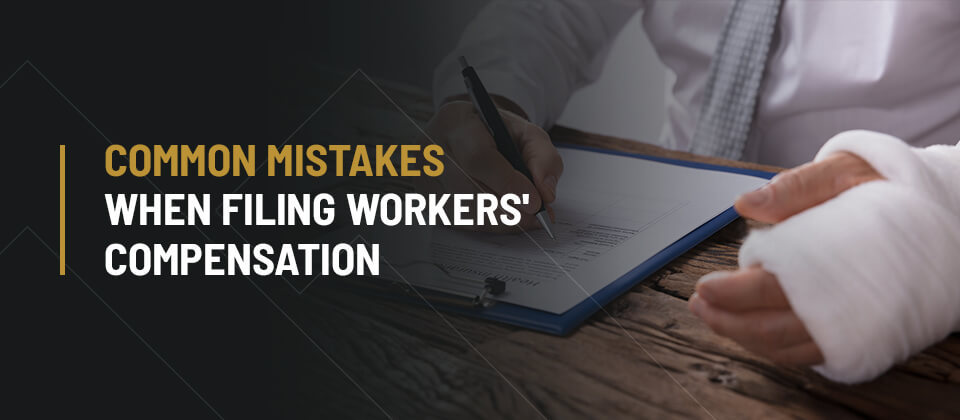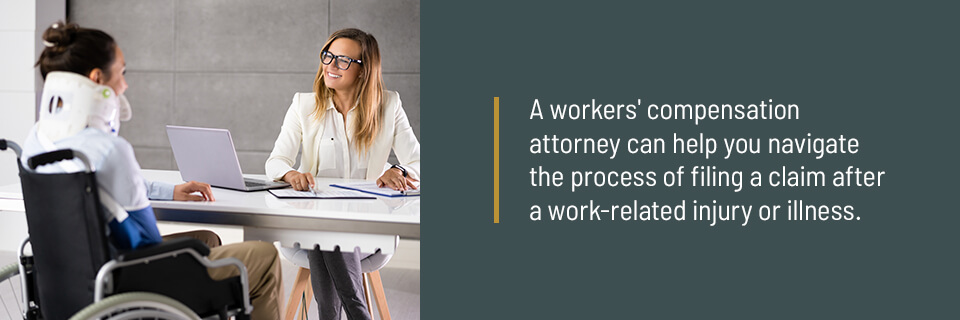If you suffer an injury or become ill at the workplace, you may want to consider filing for workers’ compensation benefits. Workers’ compensation is intended to protect you, and you can use the benefits to cover medical bills and lost wages. If you have not filed a workers’ comp claim before or are unfamiliar with the filing process, you may find it overwhelming.
We see the common mistakes employees make when filing workers’ comp claims, and we want to help you avoid them. At Frommer D’Amico, we can help you file your claim and receive the benefits you need to pay your bills, support your family and focus on your recovery.
1. Delaying When You Report Your Injury
Reporting is the first step in the workers’ comp claim process. If you are injured at work, you should report it as soon as possible. Inform your employer verbally and in writing about your injury or diagnosed illness. Be sure to keep a copy of your written notice so you have evidence that you reported the injury to your employer. In Pennsylvania, you should report your injury within 120 days. Waiting longer than 120 days can hamper your recovery and may lead to a rejection of your claim for workers’ compensation benefits. The sooner you report it, the better.
Additionally, notifying your employer immediately can better support your claim that the injury occurred at the workplace. You may also want to update your employer about your medical treatment and recovery.
2. Waiting to Seek Medical Attention
Getting immediate medical attention is essential for supporting your workers’ compensation claim. If you do not seek medical attention right away, your employer and their insurance company may argue that your injury isn’t as bad as you’re claiming. For a major injury, a colleague should take you to a walk-in clinic or the emergency room. If you don’t seek medical attention, your injuries could get worse, and you could risk losing the benefits you’re entitled to. Along with seeing a doctor right away, be sure to go to your follow-up appointments.
3. Going to an Unauthorized Doctor
While you may be inclined to visit your primary care physician after suffering an injury or illness, you will likely need to visit an authorized doctor instead. Your employer or their insurance company should provide a list of doctors you are authorized to see for your workers’ comp claim. When you report your injury to your employer, ask for information regarding authorized medical care providers for your injury or illness. Follow the doctor’s instructions and take the necessary medications for your recovery.
4. Forgetting to Document the Details of the Accident
To make a successful workers’ comp claim, you must document the details of the accident that caused your work-related injury. Remembering the details of your accident after time passes can become difficult, so it’s crucial to jot down these details as soon as possible after you’re injured. Document what you were doing before the accident, what you were doing when the accident occurred and what you did immediately following the accident.
Note the names of any witnesses, along with their contact information. Describe how witnesses reacted and if they said anything after your accident. Write down any actions and conversations that took place immediately before, during and after your accident because you will need this information for your workers’ compensation claim.
5. Failing to Keep Adequate Records of the Injury and Treatment
Whenever possible, keep copies of your medical records to support your workers’ comp claim, including your:
- Bills
- X-rays
- CT scans
- MRI scans
- Test reports
- Prescriptions
Keep records of every cost related to your injury, such as medical or transportation bills, lost wages and special services. While you may be able to ask your workers’ comp attorney to collect and document this information later, doing so now can save you time, energy and money. You can also reduce the risk of errors and forgotten records.
6. Turning Down the Offered Job
Workers’ compensation is meant to provide benefits that assist you financially until you recover and can return to work. Keep your employer informed about the doctor’s findings and what types of work you can and cannot do during your recovery.
If your doctor approves specific work tasks and your employer offers this work to you, you should accept this offer if you are trained and qualified. If you turn down the offer, your benefits may be discontinued. If you want a second opinion from a different doctor, you can put in an appeal.
7. Pushing Yourself to Do a Job That Prevents Your Healing
You cannot be forced to work while still injured, even after receiving a Notice of Ability to Return to Work. Working too soon after an injury can make your injury worse. You should be fit to do the job you accept. If a job prevents or interferes with your recovery, you should do that job. For example, if you are in pain while performing a job duty, this is a sign that you are pushing yourself to do a job that could prevent your healing and hinder your recovery.
Before you accept a job offer, review the job description and ensure you can handle the work at your current stage of the recovery process. This way, you can avoid stalling or even undoing your progress toward healing. Consult your attorney if you receive a Notice of Ability to Return to Work.
8. Being Noncompliant With Your Return to Work Plan
A return to work plan includes modified, light-duty work that helps alleviate your stress and your employer’s, giving you a way to ease back into work even if you cannot perform your normal job duties. Light-duty work is temporary and less physically taxing. Options for light-duty work may include:
- Working at a desk
- Monitoring cameras
- Completing paperwork
- Supervising work areas
This plan helps give you financial security and keep your skills sharp. If you comply with this plan, you can continue making money, keep your position and help your workplace maintain productivity. To comply, you’ll continue with this light-duty work until you fully recover.
9. Proceeding Without Hiring Expert Workers’ Compensation Attorneys
A workers’ compensation attorney can help you navigate the process of filing a claim after a work-related injury or illness. To ensure you file your claim successfully and receive the benefits you deserve, you should hire an expert attorney who specializes in workers’ comp laws. If you have suffered a work-related injury or illness in Pennsylvania, hire the expert workers’ comp attorneys at Frommer D’Amico.
10. Accepting a Settlement
Filing a workers’ comp claim can be a lengthy process. If the process takes a while, accepting a settlement can be tempting. However, if you accept a settlement, you could receive less compensation than you deserve. To avoid this, thoroughly review the settlement agreement and discuss your situation with a workers’ comp attorney. This can help ensure you get the maximum amount of benefits possible. Your workers’ comp attorney can also help you adjust a settlement or file an appeal.
Injured on the Job? Frommer D’Amico May Be Able to Help
At Frommer D’Amico, our attorneys are workers’ compensation experts. We’ll give you personal attention, answer your questions, take your calls, handle major litigation and deal with unpaid medical bills or late checks. Our history of securing millions in settlements for our clients means we can help you get the money you deserve.
We practice in the workers’ comp field exclusively, so you can trust our expertise and efficiency. Contact us at Frommer D’Amico to learn more about how you can overcome common mistakes when filing a workers’ compensation claim.



